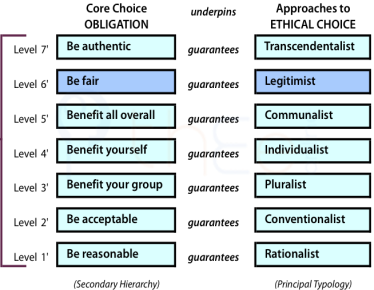Why Carrot-&-Stick is so Popular

The opprobrium heaped on the method is fascinating and foolish. ![]() More ►
More ►
Both the stronger and the weaker shapers of work behaviours depend on seniority of status and raise issues of fairness. are variably distributed and tend to be more public, so they raise fairness issues more acutely than .
Fairness, being ethical, links naturally to the framework of approaches to . These are used in the frameworks for politics, where they are summarized from Ch.6 of Working with Values.
The issue here is not , as might be expected based on its obligation to be fair, but rather about what «type of obligation» is relevant to . In the organizational context (as in society generally), whether or not something is judged «fair» is primarily based on and acceptability. Any manager is constrained to in an acceptable way. So the identity type required here is the .
is an extremely common identity type, and that is why, despite intense academic and social disapproval, «» management methods are used so widely.
Originally posted: 20-Oct-2011
